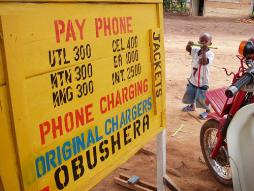Mobile phone businesses are transforming families and villages in Uganda, writes Tatum Anderson of the BBC. The article profiles Joseph Ssesanga, a 24-year-old entrepreneur who started a mobile call center in his family's home.
The business began as part of a loan from a microfinance institution, and has grown into a company that operates in six villages and employs other phone operators. Ssesanga even bikes around the village offering the phone service to his neighbors. He says that the family is much better off financially, and can now afford to pay costs like school fees.
The family business now operates in six villages, employs phone operators and even provides a phone-charging service for those with their own handsets. They were able to repay the loan in four months, and today can afford to pay school fees. "We were farmers, but seasons are a major problem. We grow vegetables, but sometimes they can be damaged and you lose everything," he said to the BBC.
According to the article, the project is part of the Village Phone model. Anderson writes,
The Village Phone model was pioneered by Grameen Bank in Bangladesh. By providing small-scale loans it allowed rural women to lift themselves out of poverty. There are now 295,000 village phone operators country-wide. An offshoot, called Grameen Foundation, exported the model to Uganda in 2003. It brokered relationships between mobile operator MTN Uganda and with Ugandan microfinance institutions. The foundation has now moved to other MTN subsidiaries in Rwanda and Cameroon. "Our goal is to replicate the success of the model," says David Keogh, director of village technology at Grameen Foundation, who is working on an Indonesian project. So successful has the model become that other donors, including the World Bank, are establishing village phone operators from Senegal to Nigeria.
However, despite the reported successes of the Grameen Foundation's program, some have raised questions about the continued relevancy of the program as mobile phones have become more ubiquitous throughout the developing world, decreasing the need for phone operators. As Katrin Verclas wrote on the MobileActive blog,
Clearly, the shared access model, as described, makes sense only when there is no wide-spread phone ownership. In other words, sharing phones is only profitable if they are a high-value good and not a ubiquitous commodity accessible to even the poorest people.
Grameen and MTN are currently carrying out a 15 month study to assess what other services village phone operators could offer. According to Richard Mwami, senior manager of MTN's Public Access business, the study could result in phones with faster connections, color screens, and Internet access. However, the BBC writes that Ssesanga "doubts villagers in Kkonkoma will ask for access to the worldwide web. 'People need market prices for beans and tomatoes more,' he said." For more on the mobile web in the developing world, check out this article by Nathan Eagle.


Post new comment